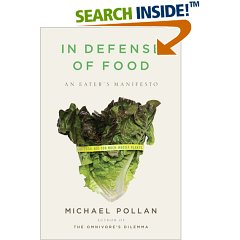
The wonderfully articulate Michael Pollan has written another book. Although he presents little new to anyone who read his previous book, The Omnivore's Dilemma: A natural history of four meals, he is such a wonderful writer, with such clever ways of seeing the world, that I couldn't resist this new, less ambitious book.
The new book is In Defense of Food: An eater's manifesto.
As in Omnivore's Dilemma, Pollan reminds us that we've lost contact with real food, foods that our great grandmother would recognize, not the just-add-water, dried, pulverized, sweetened, high-fructose, hydrogenated, shrink-wrapped, artificially-colored products that pass as foods in the grocery store.
In particular, Pollan attacks what he calls the ideology of Nutritionism. "The widely shared but unexamined assumption is that the key to understanding food is indeed the nutrient. Put another way: Foods are essentially the sum of their nutrient parts." He calls this "Nutritionism."
In the section called "Nutritionism comes to market," he uses margarine as the prototypical product of this philosophy:
"No idea could be more sympathetic to manufacturers of processed foods, which surely explains why they have been so happy to jump on the nutritionism bandwagon. Indeed, nutritionism supplies the ultimate justification for processing food by implying that with a judicious application of food science, fake foods can be made even more nutritious than the real thing. This of course is the story of margarine, the first important synthetic food to slip into our diet. Margarine started out in the nineteenth century as a cheap and inferior sustitute for butter, but with the emergence of the lipid hypothesis in the 1950s, manufacturers quickly figured out that their product, with some tinkering, could be marketed as better--smarter!--than butter: butter with the bad nutrients removed (cholesterol and saturated fats) and replaced with good nutrients (polyunsaturated fats and then vitamins). Every time margarine was found wanting, the wanted nutrient could simply be added (Vitamin D? Got it now. Vitamin A? Sure, no problem. But of course margarine, being the product not of nature but of human ingenuity, could never be any smarter than the nutritionists dictating its recipe, and the nutritionists turned out to be not nearly as smart as they thought. The food scientists' ingenious method for making healthy vegetable oil solid at room temperature--by blasting it with hydrogen--turned out to produce unhealthy trans fats, fats that we now know are more dangerous than the saturated fats they were designed to replace. Yet the beauty of a processed food like margarine is that it can be endlessly reengineererd to overcome even the most embarrassing about-face in nutritional thinking--including the real wincer that its main ingredient might cause heart attacks and cancer. So now the trans fats are gone, and margarine marches on, unfazed and apparently unkillable. Too bad the same cannot be said of an unknown number of margarine eaters."
Anyone who reads and thinks a lot about nutrition will find little new here. But nobody says it better than Pollan. While Gary Taubes (Good Calories, Bad Calories) is the real thinker of our age about nutrition, Michael Pollan is the true writer about it.
With books like these making the bestsellers list, I believe that we are gradually seeing rationality return to eating. It makes people skeptical of the glitzy ads that run on TV around the clock. I hope that Pollan's new book will make more and more people leery of the latest health claim that adorn some product. "More omega-3!" "A low-fat snack." "Heart Healthy!" "High in healthy fiber!"